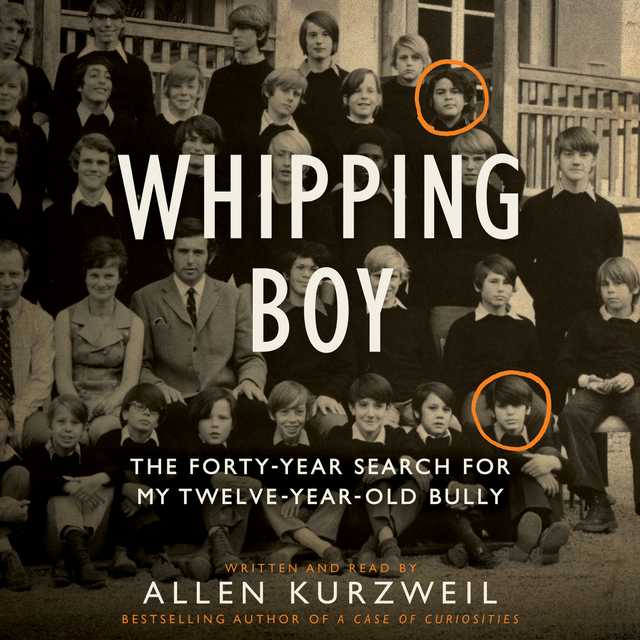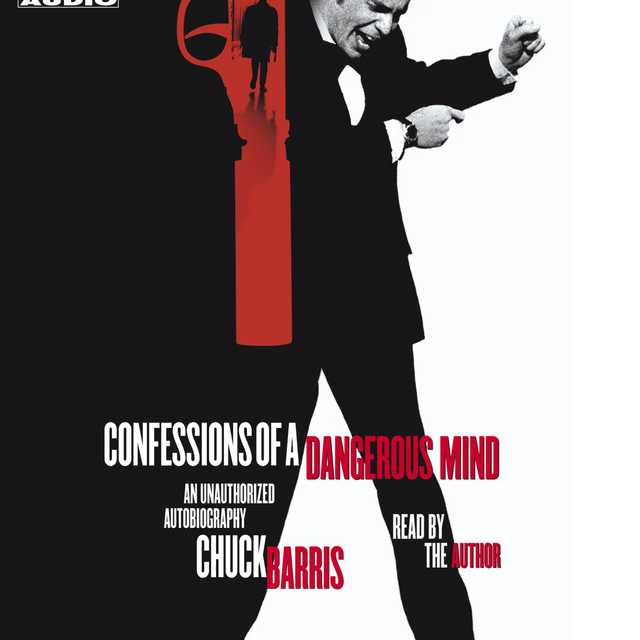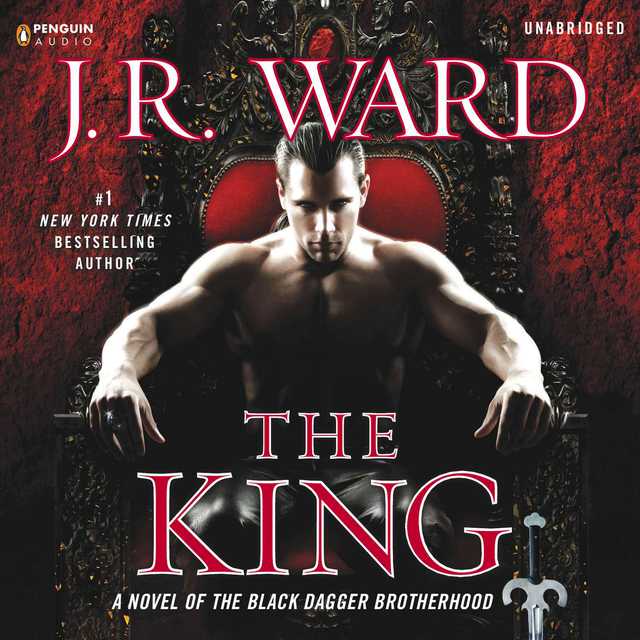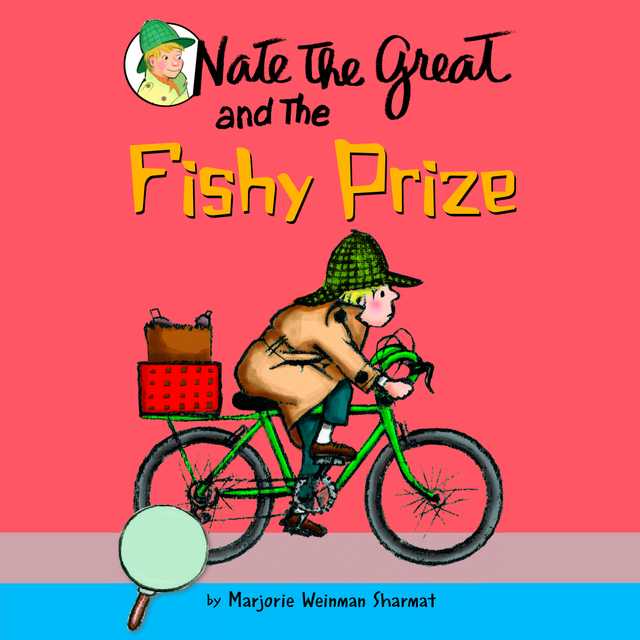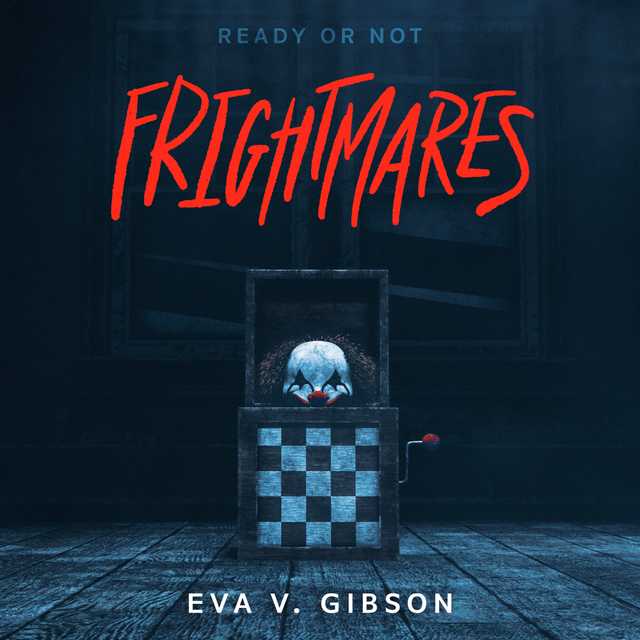Whipping Boy Audiobook Summary
Winner of the Edgar(r) Award for Best Fact Crime
The true account of one boy’s lifelong search for his boarding-school bully.
Equal parts childhood memoir and literary thriller, Whipping Boy chronicles prize-winning author Allen Kurzweil’s search for his twelve-year-old nemesis, a bully named Cesar Augustus. The obsessive inquiry, which spans some forty years, takes Kurzweil all over the world, from a Swiss boarding school (where he endures horrifying cruelty) to the slums of Manila, from the Park Avenue boardroom of the world’s largest law firm to a federal prison camp in Southern California.
While hunting down his tormentor, Kurzweil encounters an improbable cast of characters that includes an elocution teacher with ill-fitting dentures, a gang of faux royal swindlers, a crime investigator “with paper in his blood,” and a onocled grand master of the Knights of Malta. Yet for all its global exoticism and comic exuberance, Kurzweil’s riveting account is, at its core, a heartfelt and suspenseful narrative about the “parallel lives” of a victim and his abuser.
A scrupulously researched work of nonfiction that renders a childhood menace into an unlikely muse, Whipping Boy is much more than a tale of karmic retribution; it is a poignant meditation on loss, memory, and mourning, a surreal odyssey born out of suffering, nourished by rancor, tempered by wit, and resolved, unexpectedly, in a breathtaking act of personal courage.
Whipping Boy features two 8-page black-and-white photo inserts and 83 images throughout.
Other Top Audiobooks
Whipping Boy Audiobook Narrator
Allen Kurzweil is the narrator of Whipping Boy audiobook that was written by Allen Kurzweil
Allen Kurzweil is a prize-winning novelist, children’s writer, inventor, and journalist. His work has appeared in a wide range of publications, including the New Yorker, the New York Times, Smithsonian, and Vanity Fair. He is a graduate of Yale University and the recipient of Fulbright, Guggenheim, and National Endowment for the Humanities fellowships. He lives in Providence, Rhode Island.
About the Author(s) of Whipping Boy
Allen Kurzweil is the author of Whipping Boy
More From the Same
- Author : Allen Kurzweil
- Leon and the Champion Chip
- Publisher : HarperAudio
- Abraham
- American Gods [TV Tie-In]
- Dead Ringer
- House of Sand and Fog
- Prey
Whipping Boy Full Details
| Narrator | Allen Kurzweil |
| Length | 8 hours 48 minutes |
| Author | Allen Kurzweil |
| Publisher | HarperAudio |
| Release date | January 20, 2015 |
| ISBN | 9780062308573 |
Additional info
The publisher of the Whipping Boy is HarperAudio. The imprint is HarperAudio. It is supplied by HarperAudio. The ISBN-13 is 9780062308573.
Global Availability
This book is only available in the United States.
Goodreads Reviews
aPriL does feral sometimes
April 29, 2020
I liked ‘Whipping Boy’, but it is a difficult book to categorize in several ways. There is no way I can predict how the book will be for you, gentle reader, at all, since personal predilections will come into play in a truly big way, I think. Because of several content oddities, readers may be irritated or bored after reading a hundred pages, and end up skimming or returning the book to the library as a ‘dnf’. The publishing company's marketing department has done a bit of descriptive bait-'n-switch.'Whipping Boy’ is marketed as a non-fiction story combining the library classifications of memoir and true crime, which are partially true. The author, Allen Kurzweil, relates his life story and his research into a fraud case which went to trial and resulted in convictions. My library classified the book as a biography, which it partially is, as it tells the life story, briefly and incomplete, of the ‘bully’, Cesar Augustus, who was involved in the fraud case. Other libraries classify the book simply as an autobiography. In my opinion, half of the book could be classified and placed where libraries file books about financial scandals such as those about Enron, Lehman Brothers, UBS, HSBC and LIBOR, and frauds by members of the Big Five accounting firms. Libraries usually sort such book's under Social Sciences (300 in the Dewey Decimal System). This book contains a lot of detail about a similar type of financial fraud, including author interviews with some of the case’s principals and investigators.The subject matter is interesting if readers enjoy reading trauma autobiographies and business histories and books about white-collar crime, which usually are in separate books but not always, as in this book.The material of the book includes an autobiographical first-person narration of Allen Kurzweil’s life, as I previously mentioned; a history of the decades-long search by the author, using Google and personal contacts, to find the whereabouts of the bully, Cesar, who haunts Kurzweil’s mind and his entire life; and research by the author leading to a in-depth description of a white-collar bank fraud committed by a company called Badische Trust. The story is excellently organized as far as the timeline of events, although some general readers may hate the stitching together of genre types. The tone of the book veers wildly between journalistic, even sometimes academic, competence, and trembling juvenile uncertainty. Adding to the mixing up of emotional tone in the book, the people who were behind the fraudulent Badisch Trust presented themselves in the manner of vaudevillian actors. They inhabited the roles of aristocrat gentlemen as if they were intentionally performing as obvious stereotypes from central casting, so a feeling of amazement that they succeeded in tricking smart people is definitely appropriate.Every true story begins with a person remembering what happened, and then talking about it. The longer a person speaks, the more indirect information a listener hears and sees - verbal ticks, facial expressions, tone of voice, habitual tells - all that stuff between the lines which communicates so much visually to observers. Harder to figure out and put in context are the more general or opaque expressions and body movements, many of which are open to a number of interpretations, which is why knowing a person helps. Between-the-lines communication clues also occur with memoirs and autobiographies, except that indirect information is transmitted by word choices and what incidents and emotions are emphasized or diminished, what pictures and documents are included, and if there was a ghost writer or a translator. The reproducible research, memories which are verified by other witnesses, and documented events a book includes, the length of time covered in a book, the credentials of involved interview subjects, what the book describes that Google searches find elsewhere that back up described scenes, facts and incidents - all can be very important to many autobiographies (of course, some autobiographies are completely unverifiable and must be taken on trust). A good grasp of potential human behavior, developed through experience, helps.Despite the marketing of the book advertising it as being about a search for a childhood bully, which it is, it seemed to me the bully incident, while maybe affecting the author’s mentality for the rest of his life, is sort of a mcguffin in final analysis of the book’s material. Kurzweil is a writer of children's books and science articles. He has received much academic recognition and rewards in grants. Frankly, he speaks in conversations using a dialogue approach as if he were still a young boy of ten given the impression I have reached from this book, but nonetheless he is a fantastic detective and a productive journalist when he is on the job. Somehow. Plus he is married with a son. E and his family all are highly educated. I really think the book is a three-star and a half rating in considering his personal style of composing speech, if the way he self-reveals in the book is accurate, but the book is five-star as far as rating his research and perseverance, sporadic as it is. He paints his tenacity as occurring because of his anxiety and panic issues. Omg, does his anxiety really show, and man, it really grates and annoys in the reading of his memoir sections. I can see why he might prefer to stick to children's books.Although it is non-fiction, lengthy dialogue is included, most of which reminded me of the speaking manner of the childish and ignorant criminals in Elmore Leonard novels. Although the book’s conversations are between the author and family, contacts, and professionals, the impression I got of the author is one of an insecure juvenility. For me, this was very annoying. It may not be true, but that is how it seemed to me, and I was very irritated.I actually checked out both the audiobook and the hardcover of ‘Whipping Boy’ by accident. For fun, I listened AND read along. As it happened, the audiobook is narrated by the author. He has a speech cadence of talking in three - words, syllables, phrases - with a pause between each set of three, regardless of the sentence. This added to the impression of juvenility because it was done in such a nervous anxious manner! Kurzweil admits to having an anxiety disorder, as well as probably being obsessive. This book would not have been written, I think, if those two things about the author were not true, but yikes! What made me feel the author himself was an annoying human being was the author’s tone of dancing around in a hot skillet when discussing his reaction to his personal history - before, during and after ‘the whipping incident’. He appears to be someone uncomfortable with ‘owning his feelings and emotions’ as they say in publicity-speak. I know we GR reviewers are supposed to be circumspect in discussing living authors. So. Allen Kurzwell comes off as an odd duck. He may be an overly anxious person. He may be obsessive, too. He might ‘try too hard socially’ as well. He might have hobbies that he obsesses over, the obsession of which deeply embarrasses him, similar to a collector of silver spoons who is embarrassed he is obsessive and collects silver spoons. He might be none of these things in real life, but it is how he appears when writing of himself. It is annoying on the page whenever the subject is his reaction to events. It seems SO painfully awkward and wrong-footed, it is like dealing with a teenage nerd in middle school to read these parts of his book.In the end, I am not surprised he was ultimately picked on by his roommates in a boarding school if my impression from his memoir portion is correct. That said, I do NOT accept bullying in any shape or form, especially that involving torture. However, I kept wanting to reach into the pages and swat the author upside his head.*ahem*There is a graphic scene of boy wolfpack violence early in the book, and pictures of the people the author profiles (not of the violence, which happened behind closed doors when the author was a ten-year-old student). A lengthy section of Acknowledgements make clear the author went to many experts and principals involved in the fraud and at the Swiss boarding school he attended.
Chris Tarry
January 21, 2015
With out a doubt, one of the best books I've read in a long while. Certainly the only one I've read cover-to-cover in one sitting in I don't know how long. Exhaustively researched and, thanks to Kurzweil's experience as a novelist, impeccably paced and written. I kept thinking of the movie, The Usual Suspects. Kurzweil's bully becomes this kind of Keyser Söze-type character, and we all know what that means: "The greatest trick the Devil ever pulled was convincing the world he didn't exist."
Ensiform
October 03, 2020
Fiction author Allen Kurzweil writes an account of the abuse he suffered during one year in a boarding school in Switzerland at the hands of one pudgy 12-year-old, and then the many years spent obsessing over this boy and the search for what became of him. What he finds is so intriguing as to make his previous obsession, a mere gnawing at his memory over the decades, look like complete indifference in comparison. It seems Cesar Augustus, the bully, grew up to be a shill for a network of fraudsters so globe-spanning, intricate, and utterly preposterous that it would be reviled as too ludicrous to be believed if it were written into a heist film. This book is really two types of story in one, both immensely intriguing. The first section is a memoir of a school very much no longer in vogue, modeled after the old British system in which the students are expected to govern themselves and go on expeditions in the mountains more or less unchaperoned. With such antiquated staff as elocution and ski instructors, the school forbid the students to have money, instead giving out points for good behavior with which they would buy things in the nearby village, and penalizing infractions with laps or downgrades in status. (Here I wondered at an omission that is striking its absence: the total lack of even a hint of sexual impropriety at the school. With older children placed in positions of authority over younger ones, and the founder apparently having a habit of taking favored boys to expeditions to places such as the Cote d'Azur, it seems strange to me that Kurzweil has nothing to say about the possibility.) In any case, in such a place, bullying of course was rampant, and Cesar is a typical example, whipping the young Allen with a belt, calling him an anti-Semitic name, and stealing his late father's watch. While what Cesar does is undeniably horrible, there's a lot more opportunity for much worse sadism and harm than actually happens, so to me, the impact that Kurzweil places on this single school year seemed somewhat out of proportion. However, it's a good thing for readers of crazy true stories that he did remember it, because it allows us to enjoy the fantastic story of Cesar's adult criminal escapades. A colorful group of rogues, claiming to be princes, dukes, and colonels, hoodwink people into giving them earnest money for purported multi-billion loans. By obtaining associations with large banks and reputed law firms, the group was able to appear legit, despite their eccentric, bizarre behavior (the royal titles, odd rituals they insisted upon when signing contracts, forcing their victims to write letters of apology to their fictitious bank for questioning it, and so on). After the lurid details of the scam are over, the last section of the book deals with Kurzweil's meeting up with Cesar, now out of prison and into several other iffy business ventures. This section isn't as incredible, but he conveys the anxiety of confronting a childhood fear quite well. Throughout, Kurzweil tries to draw parallels between the school and Cesar's prison, the school's atmosphere and some elements of the fraud, and his and Cesar's upbringing. Some of these parallels may be stretches, but the closure Kurzweil achieves is worth the obsession.
Barbara A.
November 07, 2014
Enjoyed this one. Part memoir, part true crime. Readable, often affecting, even moving. Holy Golden Wheel of Karma! What goes around does come around! An engaging read.
Mary
January 24, 2021
I was completely swept up in this unique story. The author took me along with his story, the journey was fascinating; there was a lot of subtle humor and a lot of pain. Kurzweil sets out to look for a childhood bully and when he finds him, wow.
Lisa
March 15, 2015
Good book... Author ends up learning almost as much about himself as he does his bully. Very enjoyable read.
Fishface
August 06, 2017
This was an outstanding read. The author, wanting to work through his Swiss-boarding-school-bully issues, sets out to find the roommate who made him so miserable in 1971 and 1972. Like every book I attempt to read that supposedly has nothing to do with crime, this one turned into an epic of true-crime investigative journalism -- but this one was touched with a strange magic. No matter where this guy went and how unwelcome he was when he got there, he discovered that all doors opened for him as soon as he told them his reason for being there. "I had a bully, too," they all said, handing over the information he wanted. Written in a light, tongue-in-cheek way that made the book speed by. Full of remarkable coincidences that make the story seem almost fated to happen this way.
Lori L
January 10, 2015
Whipping Boy: The Forty-Year Search for My Twelve-Year-Old Bully by Allen Kurzweil is a very highly recommended account of a man ostensibly searching for a bully. What he finds in his search is much more interesting and satisfying.When Kurzweil was 10, he attended Aiglon College, a British-style boarding school located in the Swiss Alps, above Geneva. When there one of his roommates, Cesar Augustus, took delight in tormenting him. Kurzweil shares several incidents that traumatized him during this one year of his childhood and how the specter of Cesar loomed large in his adult life. He still remembered the verbal and physical torment Cesar put him through and his emotional pain was still present.As an adult, Kurzweil decided to do some research to try and discover what happened to Cesar and what he did with his life. There was, also, always present the idea of payback, or confrontation of Cesar for what he did to Kurzweil.What Kurzweil discovers is far more interesting than even he could have imagined. Cesar was part of a huge global banking scam that swindled millions of dollars from unsuspecting clients. It was run by the Badische Trust Consortium and Cesar was part of the group of scam artists, many posing as European aristocrats, who ran the con. Several members, including Cesar, had been imprisoned for their felonious deceit. "The consolidated rap sheet of the Badische gang included embezzlement, racketeering, arson, forgery, fraud, extortion, perjury, check kiting, probation violation, grand larceny, assault and battery, and domestic abuse." In the end this is less a book about searching for Cesar, the bully, and more the story of researching Cesar and the members of the Badische Trust Consortium. There is a satisfying meeting/discussion with Cesar. Kurzweil ends with an enlightening revelation/discovery about freeing himself from the memories of his bully.This well written, detailed account, while partially a memoir, is most certainly an engaging true crime thriller as Kurzweil researches the Badische scam artists and their crimes through the court records, etc. he is given access to use in his search. Even though his research began as a search for his bully, he found a much more interesting story in which Cesar is a bit player. Yes, he is a scam artist, but he is not the most interesting character in the search. I found myself hoping he would be able to find and confront his bully, but what Kurzweil discovers is so much more and made for a fascinating, intriguing nonfiction account of his search. Whipping Boy includes 16 pages of black-and-white photos and 83 images.Disclosure: My Kindle edition was courtesy of HarperCollin for review purposes.New Yorker Articlehttp://www.newyorker.com/magazine/201...
Counsel182
May 23, 2015
I really enjoyed this book. I would STRONGLY recommend it to anyone. It is quite an amazing story about the lengths some people will apparently go to deceive others as well as themselves as well as how we might each impact on someone's life without necessarily intending to do so.This is a very readable book even though I gather it ventures into pathways we may not all be too familiar with such as Boarding schools in Switzerland, the offices of "the biggest law firm in the world," and to an elaborate million (or even billion dollar) fraud scheme. It is hard to conceive that all of it is true and I almost think is Kurzweil seemingly deceiving us--which most assuredly he is not....he sounds like someone I'd like to go camping with...and/or with his son and/or wife who also seem like delightful people for putting up with Allen's antics. I might have glossed over SPOILER ALERT: the pranks Ceaser played on him at the boarder school. I'm sorry but they seemed to amount to me as "nothing more" than fraternity hazing (which I personally find repulsive) but in boarding school obviously it takes on a different dimension but for gods sake after 40 years you would think Allen would have "gotten over it"? But it is a fascinating story...I loved it...and what Ceasar fell into afterwards...OMG...I'd love to know this bully's reaction to the book.A few years back I ventured into Facebook...I too had my grade school bully...but sort of took care of him (but that is another tale)but I did "meet up" with a few good people I long lost touch with including someone who strangely said they had "a bone to pick with me " from years ago and while ( at least to the best of my knowledge) am no felon I can't for the life of me know what I might have done. Please read this book and let me know what you think.
Mike
June 07, 2015
Loved the idea, well put together. You ever wonder what happened to those Little Caesar's you went to school with?
Mary
September 16, 2020
Allen Kurzweil was 10 years old, small for his age, and had just lost his father to cancer when his mother sent him to a Swiss boarding school. Allen roomed at the top of a tower with four other boys in an old hotel converted to a dormitory. A pudgy twelve-year-old from Manila, Cesar was the roommate who made Allen's life a hell for that school year. Cesar threatened to toss Allen out of their third floor window, forced him to eat bread doused in hot sauce, and called him Nosey (which Allen believed was an anti-semetic jab) and other names. Cesar had a hand in stealing Allen's watch (which had belonged to his father) and coaxing another roommate to hurl it from their dorm window into the snow. The precious watch was never found. The worst bullying was when Cesar had Allen tied to a bedpost and lashed him with a belt to the music of Jesus Christ Superstar. Years after suffering these indignities, Allen continued to be tormented by them.Allen grew up to become a writer. Even Allen's wife could see he was still obsessed with Cesar. She encouraged Allen to look up his old foe. The search is slow at first. Allen finds several people in the world with the same name as Cesar. Once Allen gets on the right track the book slows down, or maybe gets bogged down, in the minute details of an elaborate scam. I don't want to spoil the rest of the book, but if you persevere you'll find out what happens to Cesar, and if Allen and Cesar become friends.It's a good story, but would be better if certain parts were condensed.
Sherry
December 23, 2021
Most memoirs are glorified pats on the back, but this author is self-deprecating and full of doubt over his search for his childhood bully. The story that unfolds is full of intrigue and legal wrangling told in prose that reads like a Turow or Grisham legal thriller. Some of my favorite entries pertain to the author’s family, especially his relationship with his son, Max. It is a delightful antidote to the author’s tragically curtailed relationship with his own father.
JANEY
May 20, 2021
This was a really interesting read. Caused me to ask myself questions - how do I remember events in childhood? How differently would someone else there remember them? Also, the 'whatever happened to...' phenomenon. For me, as someone who moved so much as a kid, I often wonder about this person or that, but there is no way for me to find out - Kurzweil did find out!
Daryth
December 11, 2018
Interesting read, I find it fascinating how sometimes single events can take such a hold on a persons life, for good or bad.A search for a childhood bully that is quite the amazing journey through international scams and deception.Some of the court document reviewing portions may not be for everyone, but I wholeheartedly enjoyed.
Emily
August 22, 2022
This was a very very fun read!! I loved watching this man grow from a scared boy to one who could defend himself. I also enjoyed seeing the character of a bully fully examined. The book feels like a therapy session for the author but it's also an interesting story to be brought along for.9/10 would recommend!
Most Popular Audiobooks
Frequently asked questions
Listening to audiobooks not only easy, it is also very convenient. You can listen to audiobooks on almost every device. From your laptop to your smart phone or even a smart speaker like Apple HomePod or even Alexa. Here’s how you can get started listening to audiobooks.
- 1. Download your favorite audiobook app such as Speechify.
- 2. Sign up for an account.
- 3. Browse the library for the best audiobooks and select the first one for free
- 4. Download the audiobook file to your device
- 5. Open the Speechify audiobook app and select the audiobook you want to listen to.
- 6. Adjust the playback speed and other settings to your preference.
- 7. Press play and enjoy!
While you can listen to the bestsellers on almost any device, and preferences may vary, generally smart phones are offer the most convenience factor. You could be working out, grocery shopping, or even watching your dog in the dog park on a Saturday morning.
However, most audiobook apps work across multiple devices so you can pick up that riveting new Stephen King book you started at the dog park, back on your laptop when you get back home.
Speechify is one of the best apps for audiobooks. The pricing structure is the most competitive in the market and the app is easy to use. It features the best sellers and award winning authors. Listen to your favorite books or discover new ones and listen to real voice actors read to you. Getting started is easy, the first book is free.
Research showcasing the brain health benefits of reading on a regular basis is wide-ranging and undeniable. However, research comparing the benefits of reading vs listening is much more sparse. According to professor of psychology and author Dr. Kristen Willeumier, though, there is good reason to believe that the reading experience provided by audiobooks offers many of the same brain benefits as reading a physical book.
Audiobooks are recordings of books that are read aloud by a professional voice actor. The recordings are typically available for purchase and download in digital formats such as MP3, WMA, or AAC. They can also be streamed from online services like Speechify, Audible, AppleBooks, or Spotify.
You simply download the app onto your smart phone, create your account, and in Speechify, you can choose your first book, from our vast library of best-sellers and classics, to read for free.
Audiobooks, like real books can add up over time. Here’s where you can listen to audiobooks for free. Speechify let’s you read your first best seller for free. Apart from that, we have a vast selection of free audiobooks that you can enjoy. Get the same rich experience no matter if the book was free or not.
It depends. Yes, there are free audiobooks and paid audiobooks. Speechify offers a blend of both!
It varies. The easiest way depends on a few things. The app and service you use, which device, and platform. Speechify is the easiest way to listen to audiobooks. Downloading the app is quick. It is not a large app and does not eat up space on your iPhone or Android device.
Listening to audiobooks on your smart phone, with Speechify, is the easiest way to listen to audiobooks.

